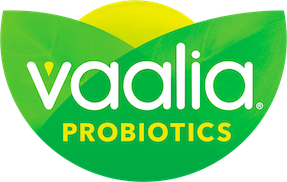Back to basics: What’s the deal with probiotics?
29 July, 2022

By Jaime Rose Chambers, Accredited Practicing Dietitian (B. Nutrition & Dietetics)
We hear the word probiotic thrown around a lot, especially when it comes to gut health and immunity, and for good reason. Probiotics have been shown to play a vital role in digestive health, and nutrient absorption, protecting us against harmful bacteria and regulating our immune system.
What are probiotics & why are they important?
Probiotics are defined by the World Health Organisation (WHO) as live microorganisms that when administered in adequate amounts confer a health benefit on the host¹. You could call them “good bacteria”.
When the gut becomes imbalanced – where there are more of the bad bacteria than the good – this is known as dysbiosis and can impact digestion, and make us more prone to nutrient deficiencies, cold and flu and other infections¹. This often occurs after taking antibiotics or having a poor or limited variety of food in the diet.
How do probiotics work in your body?
Probiotics have been shown to survive the journey through the intestines to the large bowel where the bulk of the gut microbiota is found. Here they compete with pathogenic microorganisms (or “bad bacteria”) by binding to them or by producing anti-microbial substances that can kill them off².
Around 70% of immune activity occurs in the gut – specifically the lining of the gut – where the cells are first to respond to injury and infection³. Probiotics also communicate with immune cells on their journey through the gut, training them to recognise certain allergens and pathogens⁴.
Probiotics can also help with digestion by helping to improve the regularity of bowel motions⁵.
What are the benefits of probiotics?
Not all probiotics are the same and each strain of bacteria has different effects on the body. Research has shown that specific strains of probiotics can provide relief from⁶:
- Diarrhoea and constipation
- IBS (irritable bowel syndrome)
- Gut infections (such as clostridium difficile)
- Depression, stress and anxiety
- IBD (Crohn’s disease and ulcerative colitis)
- H. pylori
- Vaginal infections
Probiotics can be taken as a supplement, but they are also found in abundance in many of our everyday food sources, for example Vaalia Probiotic Kefir Yoghurt, which contains specific probiotic strains proven to support digestion and immunity, plus you’re also getting important nutrients like calcium and protein as part of a delicious meal or snack!
Probiotics can also be found in probiotic yoghurt, kefir and some kombucha as well as fermented foods like sauerkraut and kimchi, but as they’re not usually tested for probiotics it is unknown exactly which strains of probiotics and at what amounts they are available in these foods.
Are prebiotics and probiotics the same?
Prebiotics are often confused with probiotics, but they are quite different. Prebiotics are the fibrous plant material that is the fuel and food for probiotic bacteria. It is recommended to have a variety of different fibres and plant material to maintain a healthy microbiota.
For example, Vaalia Probiotic Kefir Yoghurt contains the prebiotic inulin, which studies have shown to increase probiotic numbers⁷. To achieve optimum gut health, we should aim to eat a diet rich in a variety of plant foods and probiotic foods, every single day.
References:
¹ “What are probiotics and how do they work?,” [Online]. Available: https://www.livescience.com/what-are-probiotics-and-how-do-they-work.
² A. Monteagudo-Mera, R. A. Rastall, G. R. Gibson, D. Charalampopoulos and A. Chatzigragkou, “Adhesion mechanisms mediated by probiotics and prebiotics and their potential impact on human health,” Applied Microbiology and Biotechnology.
³ S. Wiertsema, J. van Bergenhenegouwen, J. Garssen and L. M. Knippels, “The Interplay between the Gut Microbiome and the Immune System in the Context of Infectious Diseases throughout Life and the Role of Nutrition in Optimizing Treatment Strategies,” Nutrients.
⁴ F. Yan and D. B. Polk, “Probiotics and immune health,” Current Opinion Gastroenterology, 2011.
⁵ C. J. Martoni, M. Evans, C.-E. T. Chow, L. S. Chan and G. Leyer, “Impact of a probiotic product on bowel habits and microbial profile in participants with functional constipation: A randomized controlled trial,” Journal of Digestive Diseases, 2019.
⁶ “Probiotics: What You Need to Know,” [Online]. Available: https://www.nccih.nih.gov/health/probiotics-what-you-need-to-know.
⁷ D. Vandeputte, G. Falony, S. Vieira-Silva, J. Wang, M. Sailer, S. Theis, K. Verbeke and J. Raes, “Prebiotic inulin-type fructans induce specific changes in the human gut microbiota,” BMJ, 2017.
“Should you take probiotics?,” [Online]. Available: https://www.health.harvard.edu/staying-healthy/should-you-take-probiotics.
“Understanding the health benefits of taking probiotics,” [Online]. Available: https://www.health.harvard.edu/vitamins-and-supplements/health-benefits-of-taking-probiotics.
D. Jakubczyk and S. Gorska, “Impact of Probiotic Bacteria on Respiratory Allergy Disorders,” Frontline Microbiology, 2021.
“How to Pick the Best Probiotic for You,” [Online]. Available: https://health.clevelandclinic.org/how-to-pick-the-best-probiotic-for-you/.



